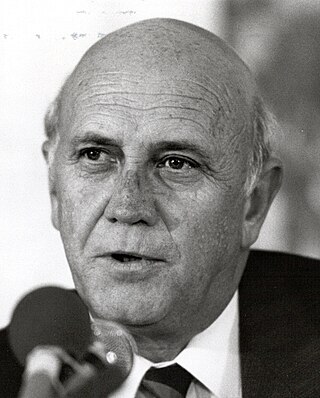
Frederik Willem de Klerk was a South African politician who served as state president of South Africa from 1989 to 1994 and as deputy president from 1994 to 1996. As South Africa's last head of state from the era of white-minority rule, he and his government dismantled the apartheid system and introduced universal suffrage. Ideologically a social conservative and an economic liberal, he led the National Party (NP) from 1989 to 1997.
The Association for Progressive Communications (APC) is an international network of organizations that was founded in 1990 to provide communication infrastructure, including Internet-based applications, to groups and individuals who work for peace, human rights, protection of the environment, and sustainability. Pioneering the use of ICTs for civil society, especially in developing countries, APC were often the first providers of Internet in their member countries.
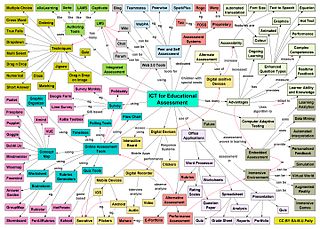
Information and communications technology (ICT) is an extensional term for information technology (IT) that stresses the role of unified communications and the integration of telecommunications and computers, as well as necessary enterprise software, middleware, storage and audiovisual, that enable users to access, store, transmit, understand and manipulate information.

The New Partnership for Africa's Development E-School Program is included as a means to provide ICT equipment such as computers and internet access to all schools in member nations within The New Partnership for Africa's Development (NEPAD) program. NEPAD parents the E-School Program and is an economic program that aims to bring economic and social development to African nations and ensure 'Africa's Renewal'. The E-School Program began with Demonstration Projects and has developed further yet remains a work in progress in many countries, facing both criticism and support.
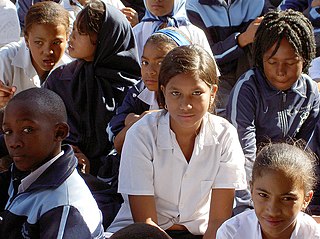
Education in South Africa is governed by two national departments, namely the Department of Basic Education (DBE), which is responsible for primary and secondary schools, and the Department of Higher Education and Training (DHET), which is responsible for tertiary education and vocational training. Prior to 2009, both departments were represented in a single Department of Education. Among sub-Saharan African countries, South Africa has one of the highest literacy rates. According to The World Factbook - Central Intelligence Agency as of 2019, 95% of the population age 15 and over can read and write in South Africa were respectively literate.
The eTwinning action is an initiative of the European Commission that aims to encourage European schools to collaborate using Information and Communication Technologies (ICT) by providing the necessary infrastructure. Teachers registered in the eTwinning action are enabled to form partnerships and develop collaborative, pedagogical school projects in any subject area with the sole requirements to employ ICT to develop their project and collaborate with teachers from other European countries.

Before the arrival of European settlers, who introduced a formal education system addressed to the elites, education in Ghana was mainly informal and based on apprenticeship. Economic activities in pre-colonial Ghana were based on farm produce shared within households and members of each household specialized in providing necessities such as cooking utilities, shelter, clothing, and furniture, and trade with other households was therefore practiced on a very small scale. As such there was no need for employment outside the household that would have otherwise called for disciplines, values, and skills through a formal education system. After colonization, Ghana's economy became a hybrid of subsistence and formal economy.
EvaluNet (Pty) Ltd is a South African-based developer of educational software headquartered in Cape Town. The company was founded in 1995 as Interactive Learning Solutions and changed name to EvaluNet in 1999. In September 1999, Naspers, a multinational JSE-listed media company, purchased a 49% share holding in EvaluNet. In 2002, the company founder and MD, Dereck Marnewick, purchased this share holding back from Naspers.

Cedric Thomas Frolick, is the current House Chairperson: Committees, Oversight and ICT in the National Assembly of Parliament for the Republic of South Africa. A teacher, politician, anti-apartheid activist. He retired from teaching in 1999 and subsequently became a politician in the National Assembly. On 18 November 2010, the ANC appointed him as the House Chairperson responsible for Committees, ICT and Oversight.

The Bambisanani Partnership is a collaboration developed by St Mary's Menston Catholic Voluntary Academy in Menston in West Yorkshire, England and Mnyakanya School in Nkandla, KwaZulu-Natal, South Africa. "Bambisanani" is the Zulu word for "working hand in hand". The Bambisanani Partnership has used sport as a catalyst to develop international understanding, education, health and leadership. The initiative, which began in 2006, has gained both national and international acclaim. The University of Leeds, Leeds Trinity University and Newcastle College are now members of the partnership and like St. Mary's School regularly have students visit South Africa to extend its work.
AfriForum is a South African non-governmental organisation focused mainly on the interests of Afrikaners, a subgroup of the country's white population. AfriForum has been described as a white nationalist, alt-right, and Afrikaner nationalist group, though this description is rejected by the organisation's leadership, who refer to themselves as a civil rights group.

AfriLabs is a Nigerian social networking service for African technology startup companies and business incubators. AfriLabs provides a network for 300 organizations across 50 nations.
The OER4Schools programme is a teacher professional development programme utilizing information and communication technologies (ICT), focussing on sub-Saharan Africa. It was initiated at the Centre for Commonwealth Education, based at the Faculty of Education, University of Cambridge. Aspects of the OER4Schools project are developed in conjunction with OER Africa.

Tafelberg School is an English medium Grade 1–12 public school in Bothasig, Cape Town, South Africa which offers remedial activities for children with special learning needs. The school was located in Sea Point before mid–2010. As of 2014, the school accommodates its full capacity of 400 students.
Longcause Community Special School is a special school for students aged 4 to 16 with learning difficulties. The college has about 100 students.
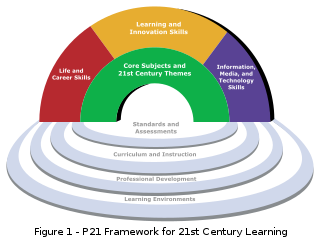
21st century skills comprise skills, abilities, and learning dispositions that have been identified as being required for success in 21st century society and workplaces by educators, business leaders, academics, and governmental agencies. This is part of a growing international movement focusing on the skills required for students to master in preparation for success in a rapidly changing, digital society. Many of these skills are also associated with deeper learning, which is based on mastering skills such as analytic reasoning, complex problem solving, and teamwork. These skills differ from traditional academic skills in that they are not primarily content knowledge-based.
Niki Davis is an educator and researcher based in Aotearoa New Zealand whose work has focused on equipping teachers to effectively deliver information and communication technologies in a global education context. Her research has explored how teaching, learning and assessment can be inclusive and ethically managed in non-traditional spaces involving E-learning while acknowledging the role of the knowledge of indigenous peoples in assisting to build critically reflective research communities. She worked in universities in the United Kingdom and the United States before becoming a Distinguished Professor at the University of Canterbury in 2008, retiring and becoming Professor Emeritus in 2020. Davis has been involved in a range of initiatives and organisations that promote knowledge of digital technologies in education and is widely published in this field.
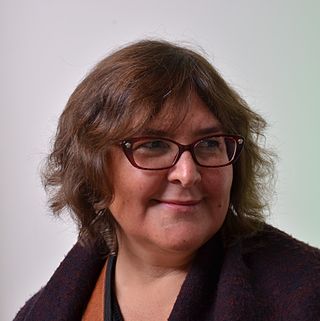
Anriette Esterhuysen is a human rights defender and computer networking pioneer from South Africa. She has pioneered the use of Internet and Communications Technologies (ICTs) to promote social justice in South Africa and throughout the world, focusing on affordable Internet access. She was the executive director of the Association for Progressive Communications from 2000 until April 2017, when she became APC's Director of Policy and Strategy. In November 2019 United Nations Secretary-General António Guterres appointed Esterhuysen to chair the Internet Governance Forum’s Multistakeholder Advisory Group.
Educational technology in sub-Saharan Africa refers to the promotion, development and use of information and communication technologies (ICT), m-learning, media, and other technological tools to improve aspects of education in sub-Saharan Africa. Since the 1960s, various information and communication technologies have aroused strong interest in sub-Saharan Africa as a way of increasing access to education, and enhancing its quality and fairness.
Virtual exchange is an instructional approach or practice for language learning. It broadly refers to the "notion of 'connecting' language learners in pedagogically structured interaction and collaboration" through computer-mediated communication for the purpose of improving their language skills, intercultural communicative competence, and digital literacies. Although it proliferated with the advance of the internet and web 2.0 technologies in the 1990s, its roots can be traced to learning networks pioneered by Célestin Freinet in 1920s and, according to Dooly, even earlier in Jardine's work with collaborative writing at the University of Glasgow at the end of the 17th to the early 18th century.











